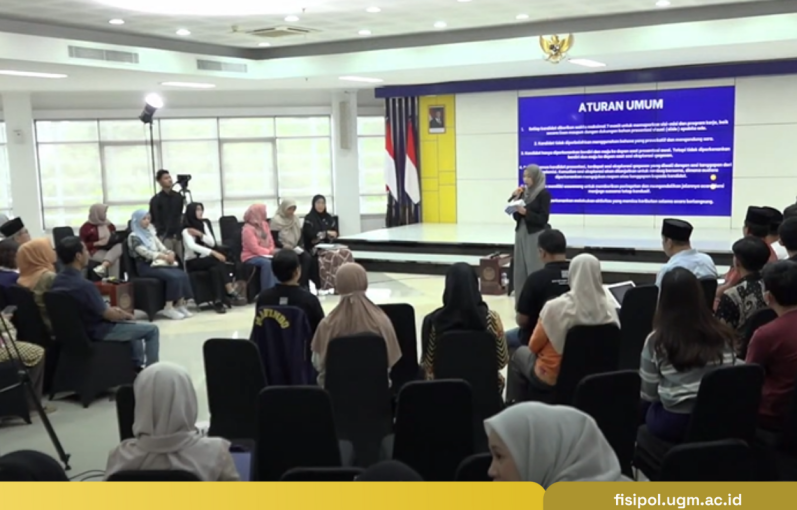
Yogyakarta, 30th of October 2024—Regional Elections (Pilkada) around Indonesia will be held simultaneously on the 27th of November 2024. The candidates for the regional elections have been voicing their vision, mission and programs through public political campaigns in recent years. Responding to this urgency, Fisipol UGM’s Department of Politics and Government (DPP) invited all of the candidates for both regent and mayor in the Special Region of Yogyakarta on Wednesday (30/10).
On this occasion, two pairs of candidates from the Bantul Regency and one representative from the other pair joined the discussion. The Bantul Regency consists of 17 Kapanewon (districts), 75 Kalurahan (villages), and 933 Padukuhan. Data from 2022 shows that the population of the Bantul Regency reached around 1.013.170 people, and is dominated by people of the productive age (15-64), as much as 74,39%. As the southernmost region of the Special Region of Yogyakarta, the Bantul Regency has great potentials for tourism.
Untoro Hariyadi and Wahyudi Anggoro, as the first pair of candidates for the Bantul Regent, argued that the Bantul Regency is a strategic area with a maritime perspective. Through developments of facilities and infrastructure, the Bantul Regency has become an area that is open to tourism as its main source of income for the region. Untoro mentioned that he wants to further develop this sector so that it can help support the welfare of the people in Bantul.
“Don’t let tourism become a sector that does not benefit its own local population. We will be working on all of the districts in the Bantul Regency so that they can get equal opportunities when it comes to tourism. With that, there will be no inequality in-between the districts,” added Untoro. Other than that, they also wanted to increase the accessibility towards education for the low-income groups in Bantul.
Contrary to the first pair of candidates, Abdul Halimusli and Aris Suharyanta, as the second pair of candidates, instead wanted to empower local culture and traditions. According to Abdul, the people of Bantul are both religious and cultured. Though this is the case, it is really not shown nor highlighted too much. This candidate offered at least seven main missions, with one of them being the transformation of human resources.
“We want to create a society that is resilient. Both physically and mentally. After that, we can increase productivity so we can compete regionally if not nationally,” explained Abdul. According to him, the Regency of Bantul does not have as many natural resources as other regencies. Therefore, the government needs to shift its focus in increasing the quality of human resources.
Next, Joko B. Purnomo and Rony Wijaya, as the third pair of candidates for the Bantul Regent, presented their vision and mission through a spokesperson. In their explanation, this candidate not only focuses on community development, but also access to healthcare. They want to make sure that everyone can get equal access to quality healthcare. They also want to make villages more independent and empowered.
Nur Azizah, as the lecturer for Fisipol UGM’s Department of Public Policy and Management, saw the three visions, missions, and programs of each candidate with the problems that are occurring in the Bantul Regency. Azizah explained that Bantul is one of the areas that became a downstream center from the Special Region of Yogyakarta. Either in water flow or waste. Almost all of the trash in the Special Region of Yogyakarta ends up in Bantul. Unfortunately, the government does not have a concrete solution in regards to waste management.
“I highlight this from a topographic perspective, that the water flow ends in Bantul. Logically, the waste will flow there, to the downstream of the river. Policies for incentivizing economic growth, while also caring for the environment, should be aligned as one agenda,” mentioned Azizah. Policies like proper waste management are crucial for the local environment, as it not only affects the health aspect, but also land availability and contamination of clean water flow.
The other thing that Azizah also mentioned is about land conversion. Data from the last few years shows that conversion of agricultural land into urban and industrial plots has drastically increased. This problem is rather complex when analyzed with an environmental and community welfare perspective. The government needs to make special efforts to maintain agricultural lands from conversion into urban land, in order to prevent a decline in agricultural productivity.
The Bulaksumur Roundtable Forum of 2024 became a form of contribution from the university to the people. Before regional elections are going to be held, the people need to know about their candidates and what they’re offering. This program also supports the UN’s Sustainable Development Goals, specifically SDG 16 Peace, Justice, and Strong Institutions.
